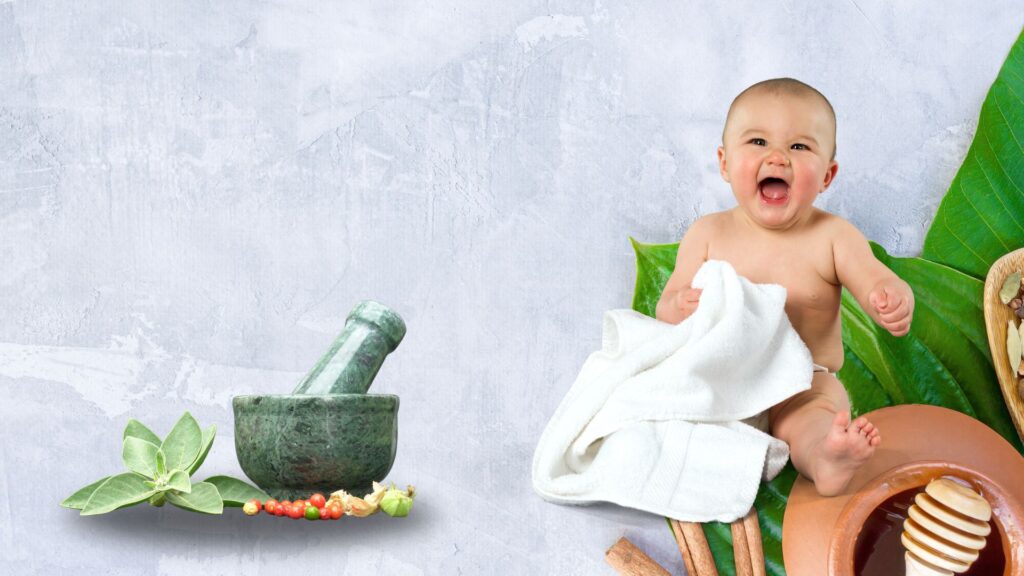
We all want the best for our children, be it education or healthcare. Ayurveda, our ancient medicine system is fundamentally a preventative approach to well-being and has a great deal of wisdom that is just as easily applied to children as adults. Ayurveda cannot only help correct imbalances that may be cropping up in kids but it can also be trusted to set our children on a lifelong path toward optimal health and well-being. The branch of Ayurveda dealing with neonatology and pediatrics is called ‘Kaumarabhritya’. It focuses on complete child health care with a focus on nutrition, immunity, and all-round development of children from 0-16 years of age.
In Kaumarabhritya, emphasis is placed on the holistic development of children, taking into account the physical, mental, emotional, and social aspects of their well-being. The branch incorporates principles of Ayurveda to provide preventive, promotive, and therapeutic measures for maintaining children’s health and treating illnesses.
Practitioners of Kaumarabhritya utilize various Ayurvedic therapies, including dietary recommendations, herbal remedies, massage techniques, and lifestyle modifications, to promote the healthy growth and development of children while also addressing any health issues they may encounter. Additionally, Ayurvedic concepts such as the balance of doshas (vata, pitta, and kapha) and the importance of maintaining digestive health are integral to the practice of Kaumarabhritya.
Let’s see how is Ayurveda important in kids :
Importance of Routine
For children, establishing a regular routine or ‘Dinacharya’ helps to synchronize their biological rhythms with the natural cycles of the day, fostering optimal growth and development. A balanced routine in Ayurveda typically includes activities such as waking up and going to bed at consistent times, eating meals at regular intervals, engaging in physical exercise, and practicing relaxation techniques such as meditation or yoga. These activities are thought to support the proper functioning of bodily systems, including digestion, metabolism, and immunity, while also promoting mental clarity and emotional stability.
By providing structure and predictability, a consistent routine offers children a sense of stability and security, which is essential for their emotional and psychological well-being. Additionally, following a balanced routine can help prevent imbalances and disorders from arising, promoting overall health and vitality in children.

Inculcating healthy lifestyle habits
Incorporating Ayurvedic principles into children’s daily routines can help them cultivate healthy habits that can last a lifetime. To nurture children’s health through Ayurveda, emphasis is placed on several key principles. First and foremost is a nutritious diet tailored to individual needs, incorporating fresh, seasonal foods rich in essential nutrients, and avoiding processed or excessive sugary foods. Incorporating Ayurvedic superfoods such as ghee, turmeric, and ginger can boost immunity and support digestion. Ayurveda also emphasizes the importance of mindful eating practices, encouraging children to eat in a calm and relaxed environment to aid digestion. Regular exercise and physical activity are encouraged to promote strength, flexibility, and vitality.
Ayurveda also emphasizes adequate sleep and rest to support growth and development. Furthermore, incorporating mindfulness practices such as meditation and yoga can help children manage stress and cultivate inner harmony. Lastly, maintaining a clean and clutter-free environment is believed to contribute to physical and mental well-being. By integrating these Ayurvedic principles into children’s lives, parents and caregivers can lay a strong foundation for a lifetime of health and wellness.
Yoga, Pranayama, and meditation for kids
Introducing children to yoga, pranayama, and meditation at an early age offers a multitude of benefits for their physical, mental, and emotional well-being. Yoga enhances flexibility, strength, and coordination, promoting healthy growth and development. It also instills discipline and body awareness, teaching kids to respect and listen to their bodies.
Pranayama, or breath control exercises, teach children the importance of mindful breathing. By learning to regulate their breath, kids develop a powerful tool for managing stress and anxiety. Deep breathing techniques also improve concentration and focus, crucial skills for academic success and everyday tasks.
Meditation including mantra meditation cultivates inner peace and emotional resilience in children. By practicing mindfulness, they learn to observe their thoughts and emotions without judgment, fostering self-awareness and emotional intelligence. Mantras are sacred sounds or phrases that carry specific vibrations and energies, capable of harmonizing the mind, body, and spirit. Meditation equips kids with coping mechanisms to navigate challenges and build healthy relationships.

Ayurvedic oil massages for kids
Ayurveda emphasizes holistic health maintenance, focusing on balancing the body, mind, and spirit. Oil massages, known as “Abhyanga”, play a crucial role in this.
Ayurvedic oil massages aid in promoting physical growth and development in children. The gentle yet firm strokes during massage stimulate blood circulation and lymphatic flow, enhancing nutrient delivery to cells and tissues. This promotes overall growth and strengthens the musculoskeletal system, facilitating better posture and motor skills development.
These massages are also essential for maintaining skin health in children. The natural oils used in Ayurvedic massages, such as coconut, sesame, or almond oil, nourish and moisturize the skin, preventing dryness, irritation, and conditions like eczema. Ayurvedic oil massages have profound effects on children’s mental and emotional well-being. The rhythmic strokes and soothing touch during massages induce relaxation, calmness, and a sense of security in children. Regular massages can alleviate stress and restlessness, promoting better sleep patterns and overall emotional resilience. Massages foster a strong parent-child bond. The nurturing touch and focused attention during massage sessions create a deep connection between parents and children, fostering trust, communication, and emotional bonding.
Herbs and supplements
Several herbs and supplements play vital roles in supporting children’s health. Ashwagandha, known for its properties, can help boost immunity and promote overall growth and development in children. Similarly, Brahmi, a renowned herb for cognitive function, aids in enhancing memory, concentration, and learning abilities. Triphala, a combination of three fruits, supports digestion and bowel regularity, crucial for children’s optimal nutrient absorption and elimination. Chyawanprash, a potent herbal jam, rich in antioxidants and immune-boosting herbs, is commonly administered to children to enhance immunity and vitality.
Ayurveda emphasizes the importance of living in harmony with nature and maintaining a healthy environment for overall well-being. Teaching children about environmental sustainability and the interconnectedness of all living beings aligns with Ayurvedic principles and fosters a sense of responsibility towards the planet and future generations. Ayurvedic practitioners assess a child’s constitution (prakriti) and imbalances (vikriti) to tailor treatments and dietary recommendations, promoting optimal health and development.
